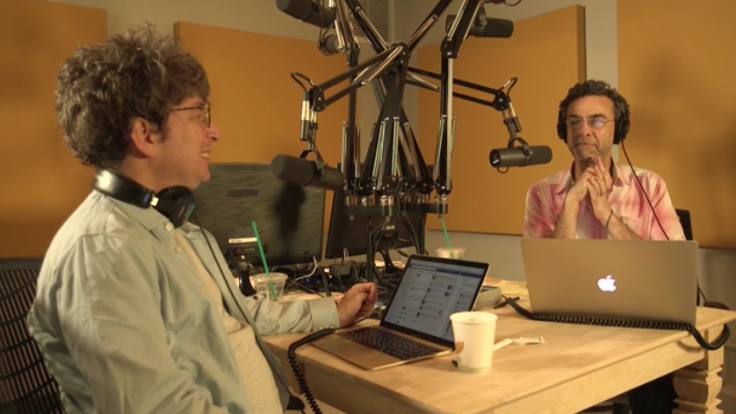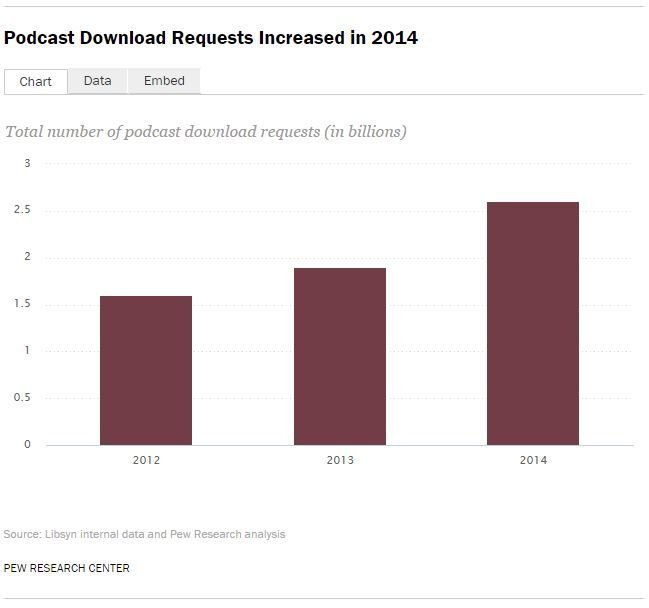Freakonomics Radio’s Stephen J. Dubner Talks About His New Podcast ‘Question Of The Day’

Earlier this month, the podcast advertising network Midroll launched Howl, a premium subscription service that would give users unlimited, ad-free access to its growing list of podcasts. On Monday, Midroll unveiled the first original show to launch since that service went live. It’s called “Question of the Day,” and it’s being driven by two experienced, proven voices in the podcasting world: Stephen J. Dubner, the co-author of “Freakonomics” and host of the wildly popular “Freakonomics Radio” podcast, and James Altucher, a former Wall Street Journal reporter and host of his own podcasts.
In the new show, Dubner and Altucher, who have known each other for years, get together and hash out questions like "Why are so many people content to work 9 to 6?" and "Why do our voices sound so weird when we hear them played back?" in quick 10-minute episodes.
International Business Times spoke with Dubner from his New York office about how far his underdog medium has come in the past year. The conversation has been edited for brevity and clarity.
International Business Times: This show grew out of a conversation between you and co-host James Altucher about the site Quora, and a lot of the first episodes' topics have been lifted from the site. Are you basically just going to be stealing your content from them?
Stephen J. Dubner: The short answer is I don't know. The long answer is, having done one podcast for five years, you know how much they change. They change based on what's enjoyable and what people respond to. If I had to make a prediction, which I am always ridiculing people for, in all likelihood the existence of this podcast will create a pipeline for people to float questions to us directly, and we won't lean on Quora as much.
It's like what economists would call a thick market: It's a lot of questions, and even more answers. If I can trawl through Quora for an hour, and peruse 500 questions, the odds of finding five or 10 good questions is good.
The other thing I like about Quora is the community of respondents. You can ask, "I wonder what it's like to work on the set of a 'Star Wars' movie,” and the person who responds will be J.J. Abrams. That said, we're not affiliated with Quora in any way. I don't really care where the stuff we work with comes from.

IBTimes: There’s a lot about this show that feels very similar to the other successful podcasts I know -- it’s very personality-driven, it’s highly specific -- but it’s also very different. The 10-minute format, in particular, surprises me. Why 10 minutes?
Dubner: One of my favorite things about artists or anybody who creates anything is when they just kind of do what they feel like doing because it fits them. I just read this great biography of Tom Petty by Warren Zanes, and it makes the point about how much of a hard-ass or a jerk he had to be to record the songs he wanted to make. People that make stuff don't want to make stuff that conforms to what distributors want.
We just kind of wanted to do what would be fun and engaging for us. I don't think long is necessarily better. I buy probably 10 to 20 books a month, and on average I read about a 10th of each of them. The world is big, life is short, and I don't want to talk about eight to 10 questions for 30 to 60 minutes.
I also like the idea -- and I have no idea if people are going to like this or not -- that people can check in on them frequently. It wasn't a market or marketing decision. But there's something about going short that keeps your brain tight and focused.
IBTimes: It also feels like a format that's perfect for native ads, too: “On today’s episode, sponsored by Harry’s, we’re thinking about whether one must be clean-shaven at a wedding.”
Dubner: That hasn't come up, but the journalist in me would certainly recoil from that.
IBTimes: So how do you plan to make money?
Dubner: Oh, I have no idea. They [Midroll] are pursuing revenue that is unrelated to the content. If you listen to the iTunes episodes that are up, there's ads on there, they're regular ads that have nothing to do with the show.
I know this is a more pressing issue now than it was 20 years ago. I came up at the New York Times, where there was a real church-and-state division. And even though that wall's come down a lot, it's something that I'm really not interested in. I'm a believer that you make content, and if it's good, and if advertisers want to be associated with content, they’ll pay for it. With "Freakonomics," we've been asked to do a lot of things that would compromise our integrity, and we've said no.
IBTimes: You and James have been podcasting for a long time, and in the past year, we've seen the format really start to grow up a little. What's surprised you most about this change?
Dubner: If you had said to anybody 10 years ago, "I think one of the most interesting developments in the media world is going to give rise to old-fashioned radio programming," people would have thought you were an idiot. It's really hard to predict how economic developments will affect people's behavior, but it seems podcasting is great for people. It happens to be a medium that performs really well in multitasking circumstances: if I want to drive, if I want to go for a run, if I want to work out or work around the house. But we hear a lot from people who do paid work and listen to podcasts. It's a really great complement to certain activities.
And because it's so easy and cheap to distribute, it allows for massive supply to accumulate. Because the architecture is so easy and cheap, and because we're all able to freely ride on these systems that have been set up for other people and other purposes, it allows for massive creative experimentation.

IBTimes: It has been great, as you say, at generating supply, and we’ve spent the past decade and change seeing content become better, and more widely available, for free. But it also seems like we’re starting to see the pendulum begin to swing the other way. Podcasting came of age during that first, free swing. Do you think it will continue to grow as the pendulum begins swinging back the other way? Will paid podcasting do well?
Dubner: I think it's going to be both. It's never going to be an either/or. Netflix is worth several billions of dollars, and Hulu is worth less. I think within this space, which is obviously much smaller, if there’s enough money to support paid and free, both will exist.
There's a lot of factors to consider. How good are different entities at selling ads? You'd want to consider the ad sales and CPMs of the public sector, which have a lot of the podcasts, and private sector. Then there's the regulation, and the donors, which is a huge part of the architecture.
I would love for Howl to work, in part because I'm affiliated with them, but also because it's nice for any product or market to have some segmentation, because people have heterogeneous preferences. The other thing that Howl offers, I think, is the idea to do different kinds of programming. If Will Ferrell wants to do a six-part podcast but doesn't want to commit to a weekly or daily podcast, a subscription service like that affords him that opportunity, and so it really opens up the creative possibilities.
The worst part about podcasts right now is the contracts. There's 20 different things you have to think about. Everybody is making up a business model as they go, and everything is very negotiable.
© Copyright IBTimes 2024. All rights reserved.





















